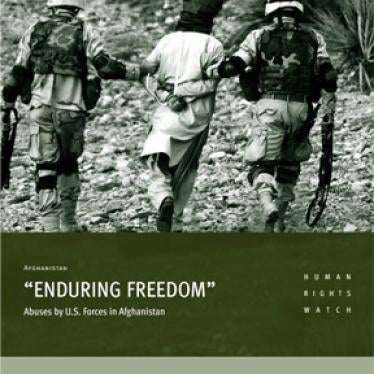On the afternoon of December 13, U.S. military officials publicly stated for the first time that since late 2001 a total of eight persons have died while in the custody of U.S. forces in Afghanistan.
New cases of prisoner deaths have emerged from U.S. detention facilities in Afghanistan, Human Rights Watch said today in an open letter to U.S. Secretary of Defense Donald Rumsfeld. Human Rights Watch said the newly uncovered cases highlight the government’s continuing failure to establish accountability for abuses, and urged Rumsfeld to speed investigations and prosecutions of personnel and officials implicated in cases of mistreatment and death.
“It’s time for the United States to come clean about crimes committed by U.S. forces in Afghanistan,” said Brad Adams, Asia division director for Human Rights Watch. “The United States has to get serious about prosecuting people implicated in prisoner deaths and mistreatment.”
The newly-uncovered cases include:
- A new case from 2004. Sher Mohammad Khan was arrested on September 24, 2004 during a raid on his family’s home near Khost. He died later the next day at a U.S. military base.
- A new case from 2003. Researchers with the Crimes of War project, a non-government organization, uncovered a death in custody in September 2004. Jamal Naseer, a soldier in the U.S.-backed official Afghan Army, was allegedly killed in March 2003 after he and seven other soldiers were mistakenly arrested by U.S. forces and then taken to a base in Gardez and tortured.
- A new case from 2002. New evidence has emerged of an alleged murder of a detainee by four U.S. military personnel in or before September 2002—thought to be the earliest known death of a detainee in U.S. custody in Afghanistan.
A total of six detainees are now known to have died in U.S. custody in Afghanistan, including four known cases of alleged murder or manslaughter. The United States has announced only a handful of criminal investigations into abuses and deaths in Afghanistan, and has publicly charged only two people with any crime.
“The U.S. government is dragging its feet on these investigations,” said Adams.
Human Rights Watch said today that the failure to investigate and prosecute abuses had created a culture of impunity among some interrogators, and allowed abuse to spread. Several military guards and interrogators implicated in earlier abuses in Afghanistan, before the Iraq war, were later sent to work at Abu Ghraib. Some of these personnel have been implicated in new abuses there.
In the letter today, Human Rights Watch also called on the Secretary of Defense to order the public release of an internal Pentagon investigation of detention operations in Afghanistan conducted this summer by Brig. Gen. Charles H. Jacoby.







